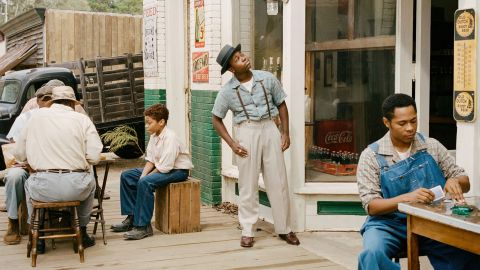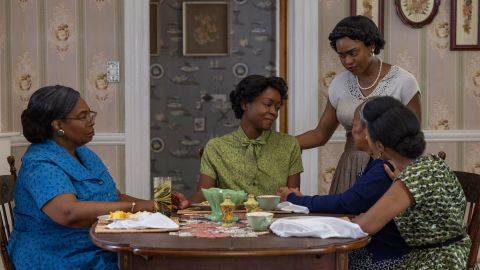How the filmmakers behind ‘Till’ depicted Black trauma without showing violence
Chinonye Chukwu didn’t want to make a movie about Black trauma.
The director of the newly released film “Till” which centers on Mamie Till-Mobley as she fights for justice after the killing of her son, said she wasn’t interested in depicting the moment that Emmett Till was brutally beaten to death in 1955 Mississippi.
“The story is about Mamie and her journey, and so it wasn’t narratively necessary to show the physical violence inflicted upon Emmett,” Chukwu told CNN. “As a Black person, I didn’t want to see it. I didn’t want to recreate it.”
In bringing the story of Till-Mobley to the big screen, Chukwu was intentional about what she chose to show and what she chose to omit. The film doesn’t dramatize the vicious and violent manner in which Emmett was killed, but it does depict his horrifically mangled body – an image that Till-Mobley famously shared with the world and that catalyzed the civil rights movement.
Still, “Till” couldn’t avoid getting swept up into a debate about “Black trauma porn.” Soon after the release of the trailer,some corners of Black Twitter questioned why a movie about Emmett Till was even needed, swiftly characterizing it as the latest Hollywood project to capitalize on Black pain and tragedy. More than a few declared that they wouldn’t be watching.
The filmmakers behind “Till” argue that this classification ignores the care and context that they’ve brought to this story. And they’re urging audiences not to look away.
The problem with ‘Black trauma porn’
“Black trauma porn” – much like “disaster porn” or “poverty porn” – generally refers to graphic depictions of violence against Black people that are intended to elicit strong emotional responses. The implication is that these images can be needlessly traumatizing to Black viewers for whom violence is an inescapable fact of life.
Increasingly, the term has been applied not just to videos of police shootings repeatedly shared online, but also to films and TV series. Amazon’s horror anthology series “Them” and the thriller film “Antebellum” are among recent projects criticized for depicting gratuitous violence against Black characters to make a point about the evils of racism. But the “Black trauma porn” label has also been leveled more broadly at historical dramas about slavery or Jim Crow, such as Barry Jenkins’ miniseries “The Underground Railroad” and now, “Till.”

Given that wide umbrella, some experts feel that the term “Black trauma porn” is overused and dismissive, leaving little room for discussion about how creatives might explore traumatic events and experiences on screen thoughtfully.
It’s not hard to understand where the impulse to use that label is coming from, said Kalima Young, an assistant professor at Towson University whose work focuses on representations of race and gender-based trauma in media. Black people are exhausted from constantly being subjected to real-life images of Black pain and death, and seeing that replicated on screen as entertainment can feel exploitative. Still, she said it’s important to separate viral videos from creative works.
“When we use the term ‘trauma porn,’ we conflate the two, and we collapse what’s happening,” Young said. “It takes some of the nuance out of the conversation.”
Janell Hobson, a professor of women’s, gender and sexuality studies at the University at Albany, understands why some Black viewers might not have the appetite for “Till.” The two White men accused of Emmett Till’s murder were ultimately acquitted, despite later admitting to the killing, while earlier this year a grand jury declined to indict the White woman who accused him of making advances toward her. Viewers know that there was no justice, and that’s painful.

But though Hobson hasn’t yet seen “Till,” she feels it’s a mistake to call it “Black trauma porn.”
“There’s a difference between criticizing a film that is designed to exploit and to create titillation around images of Black trauma and Black pain versus a drama that is designed to raise awareness around a very troubling part of our history,” she said. “There’s a difference between telling a story of Black trauma and telling a story that is ‘Black trauma porn.’”
How Till avoids the trap of ‘trauma porn’
What, then, is the line between a story of Black trauma and “Black trauma porn?”
For Young, the distinguishing factor is context. Creators have a responsibility to justify why a particular Black character is being subjected to violence or why that violence is being depicted a certain way, she said – a balance that can be tricky to achieve in genres such as horror, in which violence has long been key. Failing to provide a clear and compelling case for those choices can contribute to a feeling that Young refers to as “empty empathy.”
“Empty empathy,” according to Young, is when viewers are invited to empathize with characters who are experiencing trauma without being provided the space or context to process those visceral feelings. In other words, it’s when trauma is presented as mere spectacle.
To avoid falling into that trap, filmmakers and TV producers have to think creatively about how they tell stories of trauma, Hobson said. That might involve subverting audience expectations as Jordan Peele’s “Get Out” does when a police cruiser pulls up at the end, or telling a familiar story from a different perspective, as “Till” does by highlighting the journey of Mamie Till-Mobley. Strong character development, as well as interspersing moments of humor or rest, can also help soften the blow, Young added.

The team behind “Till” says they’ve worked hard to tell the story of Till-Mobley sensitively. In interviews leading up to its release, Chukwu has emphasized repeatedly that the film contains no physical violence against Black people. It also grounds Till-Mobley’s story in joy and dignity – the opening scene depicts Till-Mobley driving around Chicago with a carefree Emmett singing along to the radio. The ending also closes on a lighter moment between mother and son.
But trauma, too, is integral here, and in giving this story the big screen treatment, the filmmakers are honoring the memory of the real-life Till-Mobley.
Keith Beauchamp, a producer and co-writer of “Till” who was a mentee of Till-Mobley, has a deep connection to this history. He worked closely with Till-Mobley on a documentary about the case. “The Untold Story of Emmett Louis Till” released in 2005, led to the federal government reopening an investigation into the crime. Recently, he helped unearth an unserved arrest warrant from 1955 for the woman whose accusations led to Emmett’s murder.
Beauchamp said “Till” has been 29 years in the making for him personally, and that Till-Mobley herself wanted this story to be told through film. He sees “Till” as a continuation of her fight for justice – not just for Emmett, but for all those who came after him.
“We’re not in the business of re-traumatizing America,” he said. “But this is the story of Emmett Louis Till, and it was that photograph that inspired generations of people and continues to inspire generations of people today.”
Why ‘Till’ is important
When complaints of “trauma porn” are leveled, critics often ask who a particular work is for. Put bluntly, is that depiction of Black trauma intended to appeal to the sympathies of White people?
Young considers that implication a knee-jerk reaction. While skeptics of “Till” might feel that they are plenty familiar with the history of Emmett Till, there are layers to that story that have not been fully unpacked.
“Did they truly understand the context of why the situation occurred?” Young asked. “Have we had enough time to sit in the conversation of why Mamie Till would make that decision to have an open casket?”
Whether someone considers a story about Black trauma too much to endure or whether they consider it imperative to witness is inherently subjective. It’s notable that many of the recent projects deemed to be “Black trauma porn” have been the work of Black creatives – an obvious reminder that Black people are not a monolith.

Hobson also points out that Black creatives have only recently been given the platform to tell their own stories. Viewers, of course, can opt not to watch, but Black creators should be allowed the space to air their wounds, however imperfect their attempts.
At a time when Republican state legislatures are trying to restrict discussions of race and history in schools, Young said it’s crucial that stories such as “Till” not be dismissed.
“In a country right now that is trying so desperately to tamp down on the ghosts that are living under the soil of this country, it’s important that we keep on doing this digging – that we keep on doing the sowing, that we keep on allowing a myriad of voices to tell Black experiences of racial terror and history,” she added.
Beauchamp, for his part, hopes viewers will give “Till” a chance. Till-Mobley was “the mother of the civil rights movement” – an unsung hero who never got her due. In revisiting her story now, he hopes to resurrect her spirit.
“I just want to awaken the sleeping giant of revolutionary change once again that is desperately needed in this country right now.”



